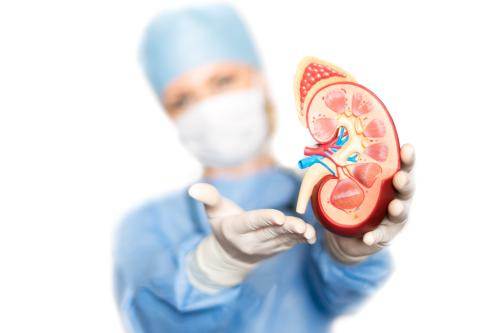
Acute kidney injury (AKI)
- Medically reviewed by
- AKF's Medical Advisory Committee
- Last updated
- April 12, 2022
What is acute kidney injury (AKI)?
Acute kidney injury (AKI) is a sudden decline in the ability of your kidneys to work and perform their normal functions. AKI is sometimes called acute kidney failure or acute renal failure.
AKI is very serious and needs to be treated right away to prevent lasting kidney damage. If AKI is treated early, most people will return to their previous kidney function. If you were healthy before AKI and you get treated right away, your kidneys could work normally or almost normally after treatment.
AKI can sometimes lead to chronic kidney disease (CKD). This usually happens if the AKI causes severe damage to the kidneys. In time, CKD can cause your kidneys to stop working altogether. This is known as kidney failure, end-stage renal disease (ESRD) or end-stage kidney disease (ESKD).
Who has a higher chance of getting AKI?
People who are sick and in the hospital have a higher chance of AKI. People who are in the intensive care unit (ICU) are even more likely to have AKI.
You have a higher chance of AKI if you:
- Just had bypass (or other major) surgery

- Were in the hospital for COVID-19 (coronavirus)
- Are age 65 or older
- Have heart disease, congestive heart failure or COPD (chronic obstructive pulmonary disease)
- Have a history of kidney disease
- Have severe, uncontrolled high blood pressure
- Take insulin for diabetes
- Have peripheral artery disease (a condition that makes it hard for your blood to get to your arms and legs)
- Are severely dehydrated or unable to keep fluids in your body
What are the symptoms of AKI?
In milder forms of AKI, there may not be any signs or symptoms and your doctor may find it when doing tests to look for other things.
In more severe forms of AKI, signs and symptoms may include:
- Urinating (peeing) less often
- Swelling in your legs, ankles or feet
- Feeling weak and tired
- Feeling like you cannot catch your breath
- Feeling confused
- Feeling sick to your stomach
- Feeling pain or pressure in your chest
- Seizures or coma (in severe cases of AKI)
If you notice a combination of any of these symptoms, talk to your doctor.
How long does AKI last?
In some cases, AKI may get better in a couple of days with observation, or medicine and fluids if needed. But sometimes the AKI is severe or affects other parts of the body, and recovery may take weeks or months.
What causes acute kidney injury?
AKI can have many different causes, but AKI usually happens when:
There is not enough blood flow to your kidneys (prerenal)
Some conditions can restrict blood flow to your kidneys, including:
Low blood pressure
Severe bleeding
Severe diarrhea
Heart disease or heart attack
Sepsis infection
Liver failure
Using more NSAIDS (nonsteroidal anti-inflammatory drugs), such as aspirin, ibuprofen or naproxen, than the label recommends
Severe burns
Severe dehydration (not having enough water in your body)
Severe allergic reaction
There is direct damage to your kidneys (intrarenal)

Some conditions can cause damage to your kidneys and lead to AKI, including:
Blood clots in your kidneys
Diseases that affect the kidneys, such as glomerulonephritis and lupus nephritis
Infection
Medicines, such as:
Some chemotherapy drugs
Some antibiotics
Contrast dyes used in CT scans, MRIs and other imaging tests
Alcohol or drug abuse
Some blood or blood vessel disorders, such as vasculitis
There is a blockage in your urinary tract (postrenal)
Some conditions can cause a blockage in your ureters (the tubes that take urine from your kidneys to your bladder), including:
Some cancers
Blood clots in or around the kidney vessels
Bladder problems
Enlarged prostate
How do doctors treat AKI?
The treatment for AKI depends on the cause and severity. Some people need to be treated in a hospital and stay until their kidneys heal. Possible treatments include:
- Medicines to control your blood pressure and adjust the electrolytes in your blood
- Treatments to keep the right amount of fluid in your body (e.g. diuretics to make you pee out extra fluid)
- If the AKI is severe and your kidneys completely stop working, going on dialysis for a short period of time. Dialysis is a treatment that uses a machine to clean your blood. Dialysis will do the work that your kidneys should be doing until they can recover.
- When you return home, following a kidney-friendly eating plan to help your kidneys heal. Your doctor may refer you to a registered dietitian.
You may have other treatments to optimize the healing of your kidneys.
How can I prevent AKI?
It can be hard to predict or prevent AKI. But living healthy and taking good care of your kidneys can help. If you have any of these causes, talk to your doctor about how you can prevent AKI.
Your donation directly supports the fight against kidney disease
For 22 consecutive years Charity Navigator™ has rated us a Top Nonprofit. Your donations allow us to help more people than any other kidney organization – from making 150 kidney transplants possible every month to delivering financial relief to 1 in 7 dialysis patients. We also fund clinical research, provide financial assistance for kidney patients affected by natural disasters, and support a National virtual pediatric camp and a Kidney Health Coach community program.

